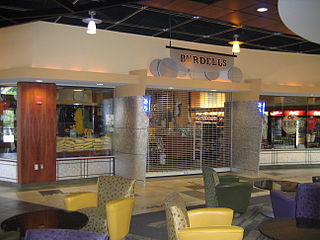
George P. Burdell is a fictitious student officially enrolled at Georgia Tech in 1927 as a practical joke. Since then, he has supposedly received all undergraduate degrees offered by Georgia Tech, served in the military, gotten married, and served on Mad Magazine's Board of Directors, among other accomplishments.

Chick-fil-A, Inc. is an American fast food restaurant chain and the largest chain specializing in chicken sandwiches. Headquartered in College Park, Georgia, Chick-fil-A operates 3,164 restaurants across 48 states, as well as in the District of Columbia and Puerto Rico. The company also has operations in Canada, and previously had restaurants in the United Kingdom and South Africa. The restaurant has a breakfast menu and a lunch and dinner menu. The chain also provides catering services. Chick-fil-A calls its specialty the "original chicken sandwich". It is a piece of deep-fried breaded boneless chicken breast served on a toasted bun with two slices of dill pickle, or with lettuce, tomato, and cheese.

The Varsity is a restaurant chain in Atlanta, Georgia. The main branch of the chain was the largest drive-in fast food restaurant in the world, taking up two city blocks and accommodating up to 800 diners. The main location ended car-side service in 2020. There are now six other branches across metropolitan Atlanta.

Technology Square, commonly called Tech Square, is a multi-block neighborhood located in Midtown Atlanta, Georgia, United States. Tech Square is bounded by 8th Street on the north, 3rd Street on the south, West Peachtree Street to the east, and Williams Street to the west. Tech Square includes several academic buildings affiliated with Georgia Tech and provides access to the campus via the Fifth Street Pedestrian Plaza Bridge, reconstructed in 2007. It also contains restaurants, retail shops, condominiums, office buildings, and a hotel.

Buzz is the current official mascot of the Georgia Institute of Technology. Buzz is usually represented as a stylized yellowjacket with yellow-and-black fur, white wings, a yellow head, and antennae. Buzz is almost never drawn with six legs, but rather with arms, legs, hands and feet, like a human. Invented in 1972 and restyled in 1979, Buzz reflects the tradition of referring to Georgia Tech students as "Yellow Jackets." Buzz is also one of Georgia Tech's emblems and trademarks, one that they defended in a 1998 legal conflict with the Salt Lake Buzz.
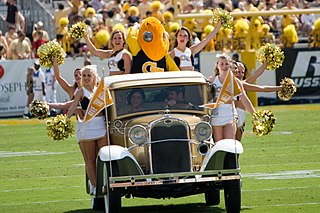
The Ramblin' Wreck from Georgia Tech is the 1930 Ford Model A Sport coupe that serves as the official mascot of the student body at the Georgia Institute of Technology. The Wreck is present at all major sporting events and student body functions. Its most noticeable role is leading the football team into Bobby Dodd Stadium at Historic Grant Field, a duty which the Reck has performed since 1961. The Ramblin' Reck is mechanically and financially maintained on campus by students in Ramblin' Reck Club.

DramaTech Theatre is Georgia Tech's student-run theater. They are also home to Let's Try This!.

Blake Ragsdale Van Leer was an engineer and university professor who served as the fifth president of Georgia Institute of Technology from 1944 until his death in 1956.

The Georgia Tech Cable Network (GTCN) is the on-campus television provider of the Georgia Institute of Technology in Atlanta, Georgia, United States. Established in 1995, GTCN serves the on-campus buildings, especially Georgia Tech Housing.
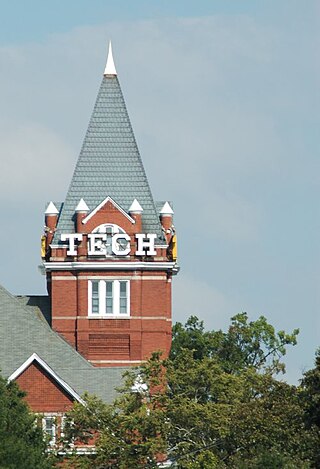
The Lettie Pate Whitehead Evans Administration Building, commonly known as Tech Tower, is a historic building and focal point of the central campus of the Georgia Institute of Technology in Atlanta, Georgia, United States.

Numerous Georgia Tech legends and traditions have been established since the school's opening in 1888, some of which have persisted for decades. Over time, the school has grown from a trade school into a large research university, and the traditions reflect that heritage. One of the cherished holdovers from Tech's early years, a steam whistle blows every weekday at various times to mark the changing of classes. It's for this reason that the faculty newspaper is named The Whistle.
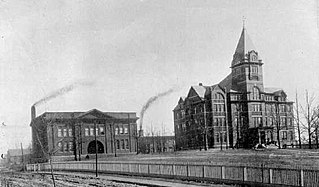
The history of the Georgia Institute of Technology can be traced back to Reconstruction-era plans to develop the industrial base of the Southern United States. Founded on October 13, 1885, in Atlanta as the Georgia School of Technology, the university opened in 1888 after the construction of Tech Tower and a shop building and only offered one degree in mechanical engineering. By 1901, degrees in electrical, civil, textile, and chemical engineering were also offered. In 1948, the name was changed to the Georgia Institute of Technology to reflect its evolution from an engineering school to a full technical institute and research university.

Brittain Dining Hall is a dining hall on the East Campus of the Georgia Institute of Technology in Atlanta, Georgia. Opened in 1928, it is named after former institute president Marion L. Brittain, and it serves as the primary dining location for all Freshman Experience and Area II housing residents. It is located on Techwood Drive across from Bobby Dodd Stadium.

The Georgia Tech Library is an academic library that serves the needs of students, faculty, and staff at the Georgia Institute of Technology. The library consists of the S. Price Gilbert Memorial Library and Dorothy M. Crosland Tower. In addition, the library is connected to and manages the Clough Undergraduate Learning Commons.

George C. Griffin (1897–1990) served in various positions at his alma mater, the Georgia Institute of Technology, most notably as dean of men from 1946 to 1964. He was known variously as "the best friend of all Tech men" and "Mr. Georgia Tech."

The Georgia Tech Alumni Association is the official alumni association for the Georgia Institute of Technology. Originally known as the Georgia Tech National Alumni Association, it was chartered in June 1908 and incorporated in 1947. Its offices have been in the L. W. "Chip" Robert, Jr. Alumni House on North Avenue since 1979.

The Georgia Institute of Technology is a public research university and institute of technology in Atlanta, Georgia, United States. Established in 1885, it has the largest student enrollment of the University System of Georgia institutions and satellite campuses in Savannah, Georgia and Metz, France.
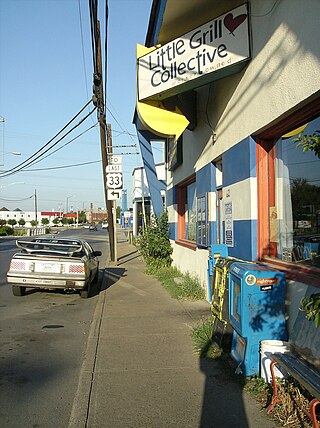
Little Grill Collective is a restaurant in Harrisonburg, Virginia. The establishment opened in June 2003

The main campus of the Georgia Institute of Technology occupies part of Midtown Atlanta, primarily bordered by 10th Street to the north, North Avenue to the south, and, with the exception of Tech Square, the Downtown Connector to the East, placing it well in sight of the Atlanta skyline. In 1996, the campus was the site of the athletes' village and a venue for a number of athletic events for the 1996 Summer Olympics. The construction of the Olympic Village, along with subsequent gentrification of the surrounding areas, significantly changed the campus.



















